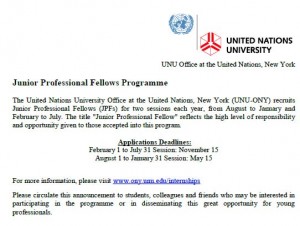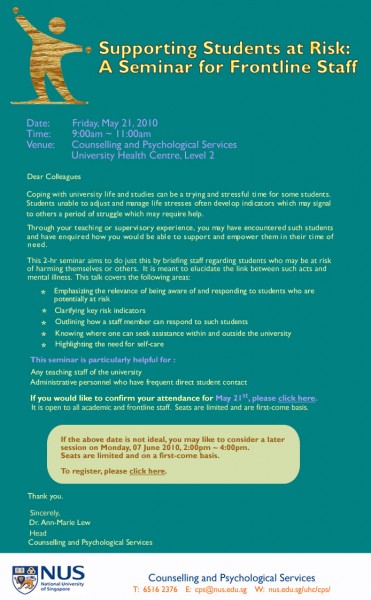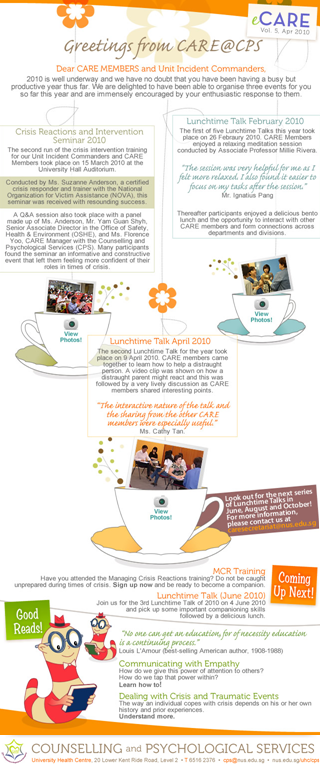Please click here for more details on the Programme. Do note that this UNU internship is semester-long, and they do not place students during the summer. Graduate students are preferred.
Month: May 2010
Script Market 2010 – A nuSTUDIOS event
by Student Blogger Ian Goh

Last Friday, on the 14th of May, nuSTUDIOS Film Productions held its annual Script Market + Script Writing Workshops for potential and aspiring filmmakers in NUS. nuSTUDIO members gathered at the Activity Room in the NUS Centre For the Arts (CFA) to present their movie ideas to a group of NUS students.
Kicking off this year’s event, Audrey Chua, Screenwriting Head for nuSTUDIO’s EXCO, welcomed the new writers, stating that the whole concept behind Script Market was literally that – to provide a ‘marketplace’ for NUS students to ‘pitch’ their movie ideas to directors, producers, and other crew members, with the intention of creating teams to actually work on their film-projects.
The concept of ‘pitching’ is common practice in the film industry, especially in Hollywood. In many cases, screenwriters often have five to ten minutes to present their stories to studio executives, (think Warner Brothers or 20th Century Fox) convincing them to invest in the project. With Script Market, pitchers had to do something similar. The atmosphere, however, could not be more relaxed and informal, with both the presenters and audience members frequently engaging in lively discussion with one another.
(Stills from Screenwriting Workshop with Director Wilson Yip)
Over the next three hours, over four scripts were presented to the audience members, with the scriptwriters having to state their loglines (movies summarised into single sentences), the plot/story outlines, as well as the main characters in their stories. This was then followed by a Q&A and feedback session with the audience, where the scriptwriters were then given advice on how to improve their stories in the long run.
Vamsi Khrisna, an NUS graduate student, pitched more than one screenplay idea to the members in attendance. His story ‘The Virtuous Path’ was about a gangster trying to come to terms with falling in love with a girl who’s very much unlike himself. Among his other pitches included a story about religious extremism and tolerance, which gathered much interest from the audience. Lastly, his final pitch was a quaint story about how two ordinary Singaporeans decide one day to don super-hero costumes and fight injustice on the streets of Singapore. When questioned about its similarities with the recent Hollywood movie, ‘Kickass’, Vamsi grinned and replied, “But I came up with the idea first.”
However, the final decision of whether a script goes into production rests upon the nuSTUDIOS Executive Committee as a whole. President of the CCA, Fang Xuezheng, highlighted the importance of the screenwriting process: “It starts with the script. That’s why an event like Script Market is important. Traditionally, we would just send out a general call for screenplays. This year however, we decided to invite them down and share their stories with us. We wanted to invite NUS students to make a movie with us.”
Overall, the event was meaningful and a success, with many people expressing interest in developing the screenwriters’ ideas into more concrete plans: completing their full-length scripts, and finally attaching directors to their projects. The participants left feeling encouraged by the responses to their ideas, and looking forward to the day where they see a director barking orders into a bullhorn, to actors scrambling to their positions, all the while referring to a bunch of papers in their hands for instructions – the same bunch of papers they once wrote.

nuSTUDIOS is constantly on the look-out for potential ideas for movies. Its most recent production, Durian Complex, was screened as part of the NUS Arts Festival in March this year, garnering favourable responses. Upcoming projects include collaborations with local music artistes, considerations for a ‘Singapore, I Love You’ project, as well as numerous other short film productions.
If you think that you have an idea that is original, local, and entertaining, do consider contacting the team further on their website: http://www.nustudios.org/
New theme talks at the FASS OPen House
by Student Blogger Dorothy Tan
We are all familiar with the hit television series “The Little Nyonya”, frustrated at the erratic weather, frightened about the Red Shirt demonstrations in Bangkok and worried about the low fertility rates in Singapore. But come 22 May, be challenged to go beyond feelings and tackle current issues ranging from modern television to climate from a multi-disciplinary perspective. You are definitely in for a treat at this year’s FASS Open House, as the leading lecturers of various departments share invaluable insights and experiences from their area of expertise. Come and discover how the social sciences are relevant in tackling current issues from different perspectives, and explore the endless prospects that await you from the Departments of Sociology, Geography, Southeast Asian Studies and Theatre Studies, just to name a few.
Baby Not-so Boomers
Representing the Department of Sociology is A/P Paulin Straughan, who is also FASS’s vice-dean of Undergraduate Studies appointed Nominated Member of Parliament (NMP). You may find her a familiar face, as she appeared on a recent episode of “Singapore Talking”, shedding light on the topic: “Has the role of Mothers changed overtime?” It is no wonder that at FASS Open House, she will be discussing on the low fertility in Asia and the implications it has on Singapore, entitled “Stork and Cupid: Out to Lunch”. A/P Straughan is very excited to share her great interest in the modern family and deep insights as she revealed:
“As you would have noted, there has been a lot of debate raised on the number of foreigners in Singapore. As a result of our chronic low TFR (total fertility rate), we have not been able to grow our population without augmentation from immigration. But that has, as we have seen, resulted in other social problems. For a small nation-state with no resources other than manpower, low fertility and late marriage have serious implications on social stability and economic sustainability. So my talk addresses a very serious social issue facing Singapore. And the topic is of interest to youths as you are the next generation of thought leaders and parents-to-be.”
Be sure to catch A/P Paulin Straughan, as she tackles the ever-pressing problem of low fertility from a sociological perspective on the 22nd May, Lecture Theatre 11 (LT11) at 1pm!
Smokin’ Hot
Prof David Higgit will be representing the Geography department, delivering a talk entitled “Climate Change: How will Singapore Survive?” Together with Prof T C Chang, Prof Higgit will be addressing the threat of climate change and its implications for environments and societies around the world. Specifically, it focuses on the effects of climate change on Singapore; Singapore’s contributions to the problem; as well as how the country is coping with and combating this global threat. Prof Higgit stresses that climate change is a serious issue that cannot and should not be ignored:
“It is a hugely important topic that has generated sustained media attention and quite a lot of controversy recently. It seems that many people in Singapore feel that climate change is something that will happen to other people elsewhere. I want to take the opportunity to explore what geographers are contributing to the climate change debate both in terms of environmental science and social science research. This will help to identify some issues that should be of concern to Singapore in the near future.”
Come and be inspired by the difference that you can make in the environment, but more importantly, discover for yourself the research strengths and teaching capabilities of the Department of Geography at NUS! Prof Higgit will be delivering his talk on 22nd May, Lecture Theatre 13 (LT13) at 11am!
Not Just a Pretty Face
Ever wondered what would happen if Juxiang from “The Little Nyonya” encountered Emily from “Emily of Emerald Hill”? Dr Paul Rae, from the Department of Theatre Studies, is the author of Theatre & Human Rights (Palgrave Macmillan, 2009), and the co-artistic director of spell#7 performance. He will be exploring what wily stage veteran Emily and upstart media darling the Little Nyonya have to say to each other about theatre and television, Peranakan fever, gender politics, and the ‘mandarinisation’ of the past. Dr Rae is looking very forward to deliver his talk entitled “Showdown! Little Nyonya vs Emily of Emerald Hill” because:
“It is about something many students will be familiar with, while at the same time giving me an opportunity to reflect on a number of broad themes and ideas that we address in Theatre Studies, such as the politics of representation, the role of performance in the shaping of identity, and the unique qualities of different media, be they theatre or television. I think the topic is timely, because there has been so much interest in Peranakan culture recently – or, at least, a rather nostalgic and idealised version of it – and this seems to me to say something about the larger cultural dynamics of Singapore.”
Clearly, theatre studies is not simply just reading off a script, knowing when to enter and exit the stage; this field of study tackles the deeper meanings, issues and implications behind every word and direction the author or playwright pens. You surely do not want to miss this interesting talk by Dr Rae on 22nd May, Lecture Theatre 13 (LT13) at 12pm!
Double, double, Toil and Trouble
Last but not least, representing the Southeast Asian Studies Department are Dr Irving Johnson and Dr Pattana Kitiarsa, who will be presenting on an intriguing topic about the role of supernaturalism in Southeast Asian politics. Even the employment of blood in the recent spate of political riots in Bangkok has a supernatural significance. Entitled “Blood, Magic and Politics in Southeast Asia”, Dr Johnson and Dr Kitiarsa will focus on Thailand and Thai societies both historically and presently, for instance, one good example would be the mass ‘cursing’ of General Suchinda Krapayoon in Bangkok’s main public square some years back. In addition, and historically, the building of ancient capitals was sometimes popularly associated with human sacrifice so as to create ‘city spirits’. In some instances, supernaturalism can be seen as a way to contest the powerful state as well. Through such strong examples, both speakers wish to show:
“Beliefs in supernaturalism are very much a part of everyday life and cannot be divorced from politics (which is also a cultural practice) in Southeast Asia. Politics basically is about how people understand power and control in their societies. For instance, one can think of the ritual ‘cursing’ of political figures by magical practitioners or uses of astrology and divination in the choosing of auspicious days/sites for political activity.”
You definitely do not want to miss this thought provoking and intriguing talk by Dr Johnson and Dr Kitiarsa, and discover what exciting prospects the Department of Southeast Asian Studies has to offer. Be sure to join them on 22nd May, Auditorium at AS7-01-02 at 1pm!
FASS@NUS Day 2010: The exciting world of Arts and Social Sciences beckons
by Student Blogger Denise Lee
Global Financial Crisis. WIKI leaks. Climate change. Popular Culture. Ethics. These are some of the interesting topics to be presented by speakers from the various FASS Departments. Come 22 May 2010, FASS will be launching its first-ever theme-based Open House Talks featuring diverse topics that traverse the realm of monetary issues to metaphysical contemplations. Through the specialised talks conducted by each Department, prospective students can gain new perspectives on the myriad fields of study in FASS. With 15 Departments, 19 major subjects, 28 minor programmes and 12 languages offered by the Centre for Language Studies, students are certainly spoilt for choice in their academic pickings. Bewildered by the vast range of subjects available? Fret not, FASS@NUS Day will be the perfect opportunity to explore the scope and nature of each subject and have your nagging questions answered by our friendly lecturers.
Shedding light on the purpose and aims of the talks are four speakers representing the three main divisions of FASS, namely, Asian Studies, Humanities and Social Sciences. Let’s hear them share their views on the chosen topics for the Open House Talks.
Department of Japanese Studies (Asian Studies)
Assistant Professor Simon Andrew Avenell
Talk Title: The Real Geisha: Sex, Shamisen, and Slapstick
1. Why have you decided to do this topic for the Open House?
I chose this topic because I want to show prospective students the ways we can use social science to challenge stereotypes and misunderstandings about other cultures and societies. In this lecture, I want to address some of the stereotypes about the Japanese geisha and Japan more generally and also show the usefulness of historical inquiry in area studies.
2. How is this topic relevant to students today?
Rather than the topic, I think the relevance has to do with the mode of thinking I want to show students. While knowing facts and details is certainly important, I see most relevance in using the content (in other words, a discussion about geisha) to develop a critical and analytical approach to
social phenomena. Put simply, it’s all about challenging sacred cows.
3. How can students benefit from this talk?
The benefit is in the approach I employ: critical historical analysis. I want students to be able to use their critical thinking abilities to look in behind broad generalisations and stereotypes to develop a more nuanced picture of the world. I think one of the greatest benefits of a liberal arts education is that it can help us reach our full potential as concerned, thoughtful, and empathetic human beings. It helps us become the civilised people we should be. No other area of study puts this kind of emphasis on intellectual development. I think students will benefit from my talk if they recognise these wider implications and, more importantly, try and use such modes of thinking in their everyday lives. The benefit is not monetary, it has to do with becoming a decent, reflective, and sympathetic individual.
Of course, from a historical perspective, citizens in the most economically, politically, and scientifically successful nations have always possessed these values. Scientific and technological knowledge alone is no guarantee of success and, conversely, can have tragic outcomes. The key for
individual, national, and international success is to combine the scientific and the technical with a resolutely humanist stance.
Department of English Language and Literature (Humanities)
Associate Professor Vincent Ooi
Talk Title: How English is evolving into a language we may not even understand
1. Why have you decided to do this topic for the Open House?
The title of this presentation is taken from a news article that describes how teams of language police ‘scoured Beijing on a mission to wipe out all…bad English signage’ during the China Olympics in 2008. Now that Singapore will be hosting the Youth Olympic Games soon, should our own language police scour the country to wipe out all instances of ‘bad English’ signage? What constitutes ‘bad English’? Singlish? Standard English? In the article, the author somewhat erroneously conflates ‘Chinglish’, ‘Singlish’, and ‘Singapore English’. This presentation seeks to clarify such notions.
2. How is this topic relevant to students today?
Such notions need to be clarified, especially when English has become the leading global language which is at the same time more ‘pluralistic’: there are issues of ‘linguistic ownership’, ‘local cultural norms’, and ‘international intelligibility’. We know that the English used in, say, the United Kingdom, the United States, and Australia can be noticeably different from one another, and can lead to cross-cultural miscommunication. Further, as students are connected to the Internet a lot nowadays (e.g. Facebook, blogs, online chatrooms, and instant messaging), they need to be able to differentiate such electronic language from the one used in formal spoken and written communication.
3. How can students benefit from this talk?
Students can better understand the issues needed to resolve the inherent tensions between local and international English. English as a linguistic entity in Singapore may be divided into three parts: standard English (which usually means standard British/US English), educated, ‘standard’ Singaporean English and Colloquial Singapore English, also popularly known as ‘Singlish’. Singaporean English includes such terms as handphone (or mobile phone), killer litter (heavy objects thrown from high rise buildings that can injure passers-by below) and Singapore Girl (advertising depiction of Singapore Airline’s flight stewardesses). ‘Singlish’ terms include kiasu (from Hokkien Chinese, to mean ‘afraid to lose out’), cut (verb) [=to overtake: His car cut mine) and blur (adj) [=to describe a person as dazed]. Highly proficient speakers of English in Singapore should have the ability to shift between standard English, educated Singaporean English and ‘Singlish’ to suit the occasion. On the other hand, less educated speakers can access only ‘Singlish’.
Department of Psychology (Social Sciences)
Dr Marlene Lee
Department of Social Work ( Social Sciences)
Associate Professor Ngiam Tee Liang
Talk Title: Your money or your life – that’s the gamble!
These speakers will be offering different views on the same topic.
1. Why have you decided to do this topic for the Open House?
ML: We picked the topic of problem gambling because it is a contemporary issue that has a lot relevance to our society. Aside from modern-day relevance, problem gambling is an interesting topic to examine in the local context because gambling is a culturally-accepted behaviour among certain ethnic communities. Thus, the line between acceptable and excessive levels of gambling is not always so clear.
NTL: The topic allows us to look at the impact of problem gambling on individuals, families and the community (finances, marital conflict, family relations and other psycho-social issues), and how social work can help the individual, family and the community in a holistic way (from individual therapy, to family intervention to community building).
2. How is this topic relevant to students today?
ML: The opening of the IRs has generated a lot of interest and concern about the impact of gambling at all levels – individual, family, and society. Thus, one could say that public awareness about problem gambling has grown tremendously in the last few years. It goes without saying that appropriate mechanisms of prevention and intervention (e.g., specialised gambling addiction treatment, education and awareness campaigns, socio-legal measures) have to be in place to address the adverse consequences of problem gambling. This in turn implies a need for increased mental health human resources, e.g., psychologists, social workers, counsellors. Consequently, students who are interested to pursue careers in mental health may want to hear more about the impact of gambling and to explore the role of mental health professionals in the field of gambling addiction.
NTL: For Social Work, we wish to point to the many facets of social work and let students see the bigger picture of social work — from preventive to remedial social interventions. These include social policy analysis, organisational planning and management, programme development, service delivery and social casework with individuals and families, among other approaches.
By having a bird’s eye-view of the different intervention approaches, students will learn that Social Work is a very versatile applied discipline, offering a wide variety of theoretical knowledge and people-skills in understanding and working with individuals, groups and communities. They will also find practical benefits in applying the knowledge and skills gained from studying Social Work into their personal and professional growth and development.
3. How can students benefit from this talk?
ML: Students will have the opportunity to learn about problem gambling and the potential impact of the IRs at the individual and societal level. They will also gain an understanding of factors that may contribute to help-seeking behaviours in people who develop problems with gambling. Finally, they will gain insight into the role of psychologists in aiding prevention and treatment efforts.
NTL: The topic can help students see how Social Work as a profession is relevant, practical and intellectually stimulating. Students can see how Social Work professionals identify and respond to social issues from macro- (policy-level) to micro- (individual-level) perspectives.
Students can expect an eye-opening introduction to the various disciplines from the experts themselves. For those seeking an enriching educational journey in the fascinating world of Arts and Social Sciences, FASS@NUS Day is an event not to be missed. Mark 22 May 2010 on your calendar and take the first step towards shaping your future!
Supporting Students at Risk Seminars for Staff
Click here to read about the seminar conducted for FASS teaching and administrative staff.uhcpyyi@nus.edu.sg for customised seminars and further information.
Contact Ignatius Pang at





